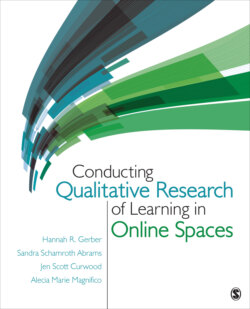Читать книгу Conducting Qualitative Research of Learning in Online Spaces - Hannah R. Gerber - Страница 20
На сайте Литреса книга снята с продажи.
Grounded Theory
ОглавлениеBarney G. Glaser and Anselm L. Strauss (1967) introduced grounded theory to research actions, interactions, and social processes—areas where they felt that other qualitative approaches fell short. Though the two sociologists can be credited with the development of this approach, other researchers have worked to further develop grounded theory methods to enable scholars to have a more fluid and less restrictive approach (Charmaz, 2006; Corbin & Strauss, 2007; Johnson & Christensen, 2014). For example, Kathy Charmaz (2006) developed her constructivist grounded theory approach to expose the power dynamics between the researcher and the researched.
Grounded theory studies rely on visits to the field site—whether through interviews, observations, or chat logs—and data analysis begins when the researcher is still in the field. The researcher moves back and forth between collecting new data and comparing it to the emerging themes in the data, a process known as constant comparison. As the researcher begins to generate theory, he or she is involved in an initial coding stage, called open coding. In open coding, the researcher takes data and segments it into multiple categories. The second step is axial coding, where the researcher identifies a core concept and returns to the data to better understand how the concept is represented within the data. The final step, selective coding, is where the researcher takes the central concept and relates it back to other categories so that the central concept becomes more refined.
Grounded theory has been used to understand the experiences of students learning in online environments (Crittendon, 2006; Feeler, 2012; Gerber & Price, 2013; Yalof, 2014). For example, in order to understand in-service teachers’ perceptions of games-based learning as a teaching practice, Gerber and Price (2013) conducted a grounded theory analysis of teachers’ discussion boards to better understand teachers’ views of games-based learning within literacy classrooms. Relying on discussion board logs, Gerber and Price studied thirteen teachers enrolled in a graduate class on videogames and literacy. Using constant comparison analysis (featuring open, axial, and selective coding), they analyzed over one hundred discussion boards to gain an understanding of teachers’ views. The use of constant comparison allowed the researchers to continually reformulate their thoughts and theories, as grounded in the discussion board data, and it facilitated the emergence of themes related to collegial surveillance and the lack of available professional development opportunities.
